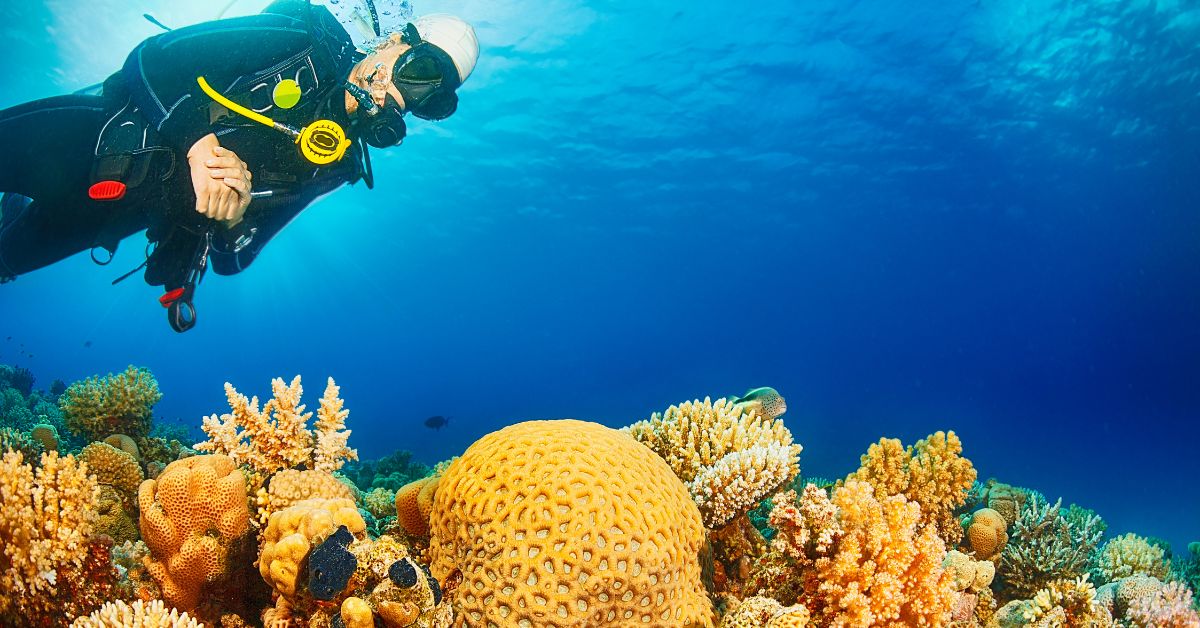Discover Eco Dive Tourism
Scuba diving is not just an adventure; it’s a gateway to exploring the wonders of the underwater world. Discover eco dive tourism, a revolutionary approach combining the thrill of diving with a commitment to preserving the ocean’s delicate ecosystems. This comprehensive guide dives into what eco dive tourism is, why it matters, and how you can make your diving adventures eco-friendly and impactful.
What is Eco-Dive Tourism?
Eco-dive tourism is the practice of engaging in sustainable diving activities that prioritize the conservation and protection of marine environments. It’s about exploring the ocean responsibly, reducing environmental impact, and giving back to marine ecosystems.
Why Sustainability Matters in Diving
Sustainability in diving refers to adopting practices and behaviors that minimize environmental harm and actively contribute to the preservation of marine ecosystems. It is a proactive approach to ensuring that the underwater world remains vibrant and healthy for both marine life and future generations of divers. When you discover eco dive tourism, you understand the importance of sustainability. Coral reefs, marine species, and underwater habitats face threats like pollution, overfishing, and climate change. Eco dive tourism ensures these ecosystems thrive for generations, allowing divers to enjoy them responsibly.
Understanding the Need for Sustainable Diving
The ocean is home to over 80% of life on Earth, yet it faces growing threats from human activities. Coral reefs, often referred to as the “rainforests of the sea,” are among the most biodiverse ecosystems on the planet, supporting thousands of species. However, they are highly sensitive to external pressures, such as:
- Pollution: Plastics, chemicals, and untreated waste flowing into the ocean cause severe harm to marine habitats.
- Overfishing: Depleting fish populations disrupts ecological balance and threatens the survival of predator and prey species.
- Climate Change: Rising sea temperatures lead to coral bleaching, while ocean acidification weakens the ability of marine organisms to build protective shells and reefs.
These challenges not only endanger marine life but also threaten the livelihoods of millions of people who depend on healthy oceans for fishing, tourism, and coastal protection.
The Role of Sustainable Diving
Sustainable diving emphasizes actions that protect the environment while still allowing divers to enjoy and explore the underwater world responsibly. This includes:
- Minimizing physical impact on coral reefs and marine habitats.
- Reducing carbon footprints associated with diving trips and equipment.
- Supporting local communities through eco-friendly tourism initiatives.
By incorporating these principles, divers help preserve the delicate balance of marine ecosystems.
How Sustainable Diving Protects Marine Ecosystems
- Safeguarding Coral Reefs
Coral reefs are essential to the ocean’s health, serving as nurseries for marine species and natural barriers that protect coastlines. Sustainable diving ensures that reefs remain undisturbed by:- Teaching divers to maintain proper buoyancy to avoid accidental damage.
- Enforcing no-touch and no-collection policies for marine life and coral.
- Protecting Marine Species
Overfishing and habitat destruction have placed many marine species at risk of extinction. By practicing sustainable diving, divers can reduce disturbances to underwater creatures, giving them a safe space to thrive. - Combating Ocean Pollution
Sustainable divers actively participate in clean-up efforts, removing debris from dive sites and advocating for reduced use of single-use plastics. These actions help keep the oceans cleaner and safer for all marine life.
Why Sustainability Benefits Divers Too
Sustainability isn’t just about the environment—it also enhances the diving experience. Pristine reefs teeming with vibrant marine life provide unforgettable adventures for divers. Healthy ecosystems also ensure the long-term viability of dive tourism, preserving access to these awe-inspiring environments.
A Call to Action for Divers
Every diver has a role to play in protecting the oceans. By embracing sustainable diving practices and supporting eco dive tourism, we become stewards of the sea. The collective efforts of the diving community can safeguard the underwater world, ensuring that it continues to inspire awe and wonder for generations to come.
Why sustainability matters in diving is not just about preserving what we see today; it’s about securing a thriving ocean for tomorrow. Together, we can make a difference!
The Rise of Eco-Conscious Travel
As more people prioritize environmentally friendly experiences, eco dive tourism is becoming a sought-after choice for travelers. Dive centers worldwide are adopting eco-friendly practices, reflecting a growing commitment to ocean preservation.
Eco-Friendly Dive Practices
The Role of Divers in Marine Conservation
Divers have a unique opportunity to protect marine life. By practicing eco-friendly habits, we can prevent harm to underwater ecosystems and inspire others to do the same.
Essential Eco-Diving Guidelines
When you discover eco dive tourism, it’s vital to understand and practice eco-friendly diving habits:
Master Your Buoyancy
- Why: Poor buoyancy can lead to accidental contact with corals, damaging fragile ecosystems.
- How: Practice in shallow water with an experienced instructor. Use small adjustments to your BCD and control your breathing to maintain neutral buoyancy.
Follow the “No Touch, No Take” Policy
- Why: Touching or taking marine life disrupts ecosystems and may harm delicate species.
- How: Keep hands off corals, avoid chasing marine animals, and leave natural items like shells and rocks undisturbed.
Use Reef-Safe Sunscreen
- Why: Traditional sunscreens release harmful chemicals into the water, damaging coral reefs.
- How: Opt for reef-safe products labeled “oxybenzone-free” or “reef-friendly.” Apply well before entering the water.
Carry a Mesh Bag for Debris
- Why: Collecting trash during your dive helps reduce ocean pollution.
- How: Bring a lightweight mesh bag to gather small pieces of debris without overloading yourself.
Respect Marine Life
- Why: Harassing marine animals stresses them and disrupts their natural behaviors.
- How: Maintain a respectful distance, avoid flash photography, and follow your guide’s instructions.
By incorporating these practices, every diver can make a significant impact on marine conservation.
Choosing Eco-Certified Dive Operators
Eco-certified dive operators adhere to strict environmental standards, promoting sustainable tourism and marine protection. They follow guidelines such as limiting diver numbers, avoiding fragile areas, and participating in conservation projects.
Our Dive Center’s Commitment to Sustainability
At our dive center, we pride ourselves on being an eco-certified operator. We partner with organizations like PADI Eco Centers and Green Fins to implement best practices in sustainable diving. From coral restoration projects to offering reef-awareness courses, our mission is to ensure every dive contributes positively to the ocean.
Marine Conservation Projects
Coral Restoration Programs
Coral reefs are vital to marine biodiversity but face threats from bleaching and human activity. Our dive center actively participates in coral restoration initiatives, allowing divers to plant coral fragments and contribute to reef rehabilitation.
Underwater Clean-Ups
Every dive is an opportunity to clean the ocean. By joining our clean-up dives, you help remove harmful plastics and debris, protecting marine life and keeping dive sites pristine.
Citizen Science Initiatives
We encourage divers to assist in research by identifying species, mapping reefs, and submitting data to global conservation databases. These contributions are invaluable for marine scientists studying ocean health.
The Benefits of Eco-Dive Tourism
Environmental Benefits
Eco dive tourism plays a vital role in protecting marine habitats. By prioritizing sustainability, it reduces pollution, prevents overfishing, and promotes biodiversity. Each eco-conscious dive contributes to the long-term health of our oceans. When you discover eco dive tourism, you contribute to protecting marine habitats and preserving biodiversity. Cleaner oceans and thriving reefs are direct results of eco-conscious diving.
Personal Fulfillment
Participating in eco dive tourism is incredibly rewarding. Knowing that your dive is making a positive difference adds purpose and meaning to every underwater adventure. Many divers report a profound sense of connection and gratitude for the ocean.
Enhanced Dive Experiences
Eco-certified operators provide education on marine ecosystems, making your dives more informative and enriching. Understanding the environment enhances your appreciation of the underwater world.
Supporting Local Communities
Eco dive tourism benefits coastal communities by creating sustainable jobs and promoting environmental stewardship. By diving responsibly, you support livelihoods and ensure long-term conservation.
Dive Destinations Known for Eco-Tourism
Pattaya, Thailand
Pattaya, Thailand, is a prime destination to discover eco dive tourism. Dive centers here actively engage in coral restoration and underwater clean-ups. The region’s vibrant marine biodiversity and wreck dives attract divers committed to preserving its beauty. Pattaya’s local dive operators also work closely with global organizations, making it a leader in sustainable diving practices.
Raja Ampat, Indonesia
Renowned for its biodiversity, Raja Ampat features eco-conscious resorts and marine protected areas, ensuring its reefs remain pristine.
Bonaire, Caribbean
Bonaire’s dedication to marine conservation is evident in its protected marine parks and strict diving regulations.
Eco-Friendly Gear and Technology
As awareness of environmental impact grows, sustainable innovations in diving gear and technology are reshaping how divers interact with the underwater world. These advancements not only prioritize the diver’s safety and experience but also ensure minimal harm to the ocean. Let’s explore some of the most exciting developments in eco-friendly dive gear and practical tips for reducing your dive footprint.
Sustainable Dive Gear Innovations
- Wetsuits Made from Natural Rubber
Traditional neoprene wetsuits, while effective, are derived from petroleum-based materials, which contribute to pollution during production and disposal. Enter natural rubber wetsuits—crafted from sustainable sources such as Hevea trees. These wetsuits are durable, offer comparable thermal protection, and are produced with significantly less environmental impact. - Advanced Rebreathers
Rebreathers are transforming the diving experience by reducing carbon dioxide emissions and enabling extended dive times. By recycling exhaled air, these systems decrease the need for frequent gas cylinder refills, minimizing the carbon footprint associated with tank production and logistics. - Eco-Friendly Dive Fins and Masks
Newer fins and masks are made from recycled plastics and biodegradable materials. These eco-friendly alternatives reduce reliance on virgin plastic while maintaining the performance required for safe diving. - Dive Computers with Solar Charging
Dive computers are essential tools, and some manufacturers now offer solar-powered options, reducing the need for disposable or rechargeable batteries. These devices are perfect for eco-conscious divers seeking a sustainable edge. - Biodegradable Dive Accessories
Accessories like mesh bags, snorkels, and even weight pouches are now being crafted from biodegradable materials. These items degrade naturally if lost underwater, helping mitigate the issue of marine debris.
Tips for Reducing Your Dive Footprint
- Choose Reusable Water Bottles and Eco-Friendly Snacks
Stay hydrated and fueled responsibly by opting for reusable water bottles and packing snacks in reusable containers. Avoid single-use plastics entirely, as they contribute significantly to marine pollution. - Pack Lightweight, Sustainable Travel Gear
When traveling for a dive trip, prioritize gear that is compact, lightweight, and made from sustainable materials. This reduces the overall weight and fuel consumption associated with transportation. - Prioritize Quality Gear that Lasts Longer
Investing in high-quality gear ensures durability, reducing the frequency of replacements. Look for products from manufacturers committed to sustainable practices and those offering repair services to extend the lifespan of your equipment. - Use Reef-Safe Sunscreen
Protect both yourself and the reefs by using sunscreens labeled “reef-safe.” Traditional sunscreens often contain oxybenzone and octinoxate, which are toxic to coral reefs. Apply sunscreen well before entering the water to prevent it from washing off and harming marine life. - Minimize Packaging Waste
When purchasing new gear, choose products with minimal or recyclable packaging. Many eco-friendly brands are moving toward sustainable packaging solutions, aligning with the principles of eco dive tourism. - Share or Rent Gear Locally
If you’re diving infrequently or traveling light, consider renting gear from eco-conscious operators. Sharing resources reduces overall production demand and supports sustainable business models.
The Role of Dive Operators and Organizations
Dive operators and organizations are at the forefront of the movement to preserve our oceans. They bridge the gap between divers and marine conservation efforts, ensuring that underwater adventures remain sustainable. At our dive center, we’re proud to help divers discover eco dive tourism firsthand and we take this responsibility seriously, committing to practices and partnerships that make a lasting positive impact on the environment and the diving community.
Our Dive Center’s Initiatives
- Hosting Environmental Workshops
Education is a cornerstone of eco dive tourism. We regularly host workshops and seminars designed to raise awareness about marine conservation among divers of all levels. Topics range from coral reef ecology and sustainable diving practices to the impact of plastic pollution. These sessions equip divers with the knowledge and tools to protect the marine environment actively. - Collaborating with PADI Eco Centers and Green Fins
As proud collaborators with PADI Eco Centers and Green Fins, we follow stringent environmental standards in all our operations. Green Fins’ guidelines ensure that our activities, from dive planning to waste management, have minimal environmental impact. This partnership also emphasizes educating our guests on responsible diving practices. - Offering Specialty Courses
Our dive center provides conservation-focused courses, such as the PADI AWARE Specialty, which highlights the importance of marine ecosystems and teaches divers how to minimize their environmental footprint. These courses blend education with action, empowering divers to become ambassadors for ocean health. - Collaborating with Project AWARE
Partnering with Project AWARE, we participate in global initiatives such as Dive Against Debris, where divers collect and report underwater trash. These efforts contribute to scientific data and drive meaningful change in reducing marine pollution.
Empowering Divers Through Action
Our goal is to ensure that every diver who enters the water leaves not just with unforgettable memories but also with a deeper appreciation and understanding of their role in protecting the ocean. By choosing our dive center, you join a community dedicated to sustainability and marine stewardship.
Challenges in Eco-Dive Tourism
While eco dive tourism has grown in popularity, it faces several hurdles that must be addressed to ensure long-term sustainability.
- Over-Tourism in Popular Dive Destinations
Many renowned dive sites are experiencing over-tourism, where high footfall threatens marine ecosystems. Excessive numbers of divers can lead to reef damage, overcrowding, and stress on marine life. Striking a balance between accessibility and conservation is crucial. - Educating Divers on Sustainability
Not all divers are aware of the potential harm they can cause to marine environments. Issues like poor buoyancy control, touching corals, or leaving behind trash highlight the need for widespread education on eco-conscious diving. Dive operators must prioritize training and awareness to mitigate these risks. - Balancing Conservation with Business Growth
As demand for eco dive tourism grows, dive operators face the challenge of scaling their operations without compromising conservation principles. This includes limiting group sizes, enforcing strict environmental protocols, and collaborating with local communities to maintain sustainable practices.
Addressing these challenges requires a collective effort from divers, operators, and conservation organizations. By working together, we can ensure that eco dive tourism remains a force for good.
How to Get Involved as a Diver
Eco dive tourism thrives on the active participation of individual divers. Whether you’re a beginner or a seasoned professional, there are numerous ways to contribute to marine conservation.
1. Enroll in Reef-Awareness and Conservation Courses
Taking courses like the PADI AWARE Specialty or marine ecology certifications allows you to dive deeper into understanding marine ecosystems. These courses provide actionable knowledge about reef health, threats to marine biodiversity, and how you can help protect the ocean.
2. Volunteer for Coral Restoration and Clean-Up Dives
Many dive centers, including ours, offer opportunities to participate in hands-on conservation efforts. By joining coral restoration dives, you can actively help rebuild damaged reefs. Similarly, clean-up dives allow you to collect underwater debris, ensuring marine life has a safer, cleaner habitat.
3. Choose Eco-Certified Operators
Support operators that are committed to sustainable practices. Look for certifications such as Green Fins or PADI Eco Center status, which indicate adherence to environmental guidelines. When you dive with us, you can trust that every trip aligns with eco-friendly principles.
4. Advocate and Share
As a diver, you have the power to influence others. Share your knowledge and experiences with fellow divers, friends, and family. Encourage them to adopt sustainable habits and consider eco dive tourism for their underwater adventures.
5. Support Conservation Initiatives
Beyond diving, consider donating to organizations like Project AWARE or volunteering your time for community outreach programs. Every contribution, no matter how small, makes a difference.
By taking these steps, you can turn your passion for diving into a force for good, helping to protect the very ecosystems that make diving so magical. Together, let’s make eco dive tourism the standard for all underwater exploration.
Join Us to Discover Eco Dive Tourism
Ready to experience diving with a purpose? At our dive center, we specialize in eco-friendly dive courses and tours that align with your passion for marine conservation. Whether you’re a beginner or an experienced diver, our programs cater to all levels.
Explore the wonders of the underwater world while making a difference. Contact us today to book your next eco-friendly dive adventure or learn more about our conservation-focused courses. Let’s protect the ocean together—one dive at a time.


